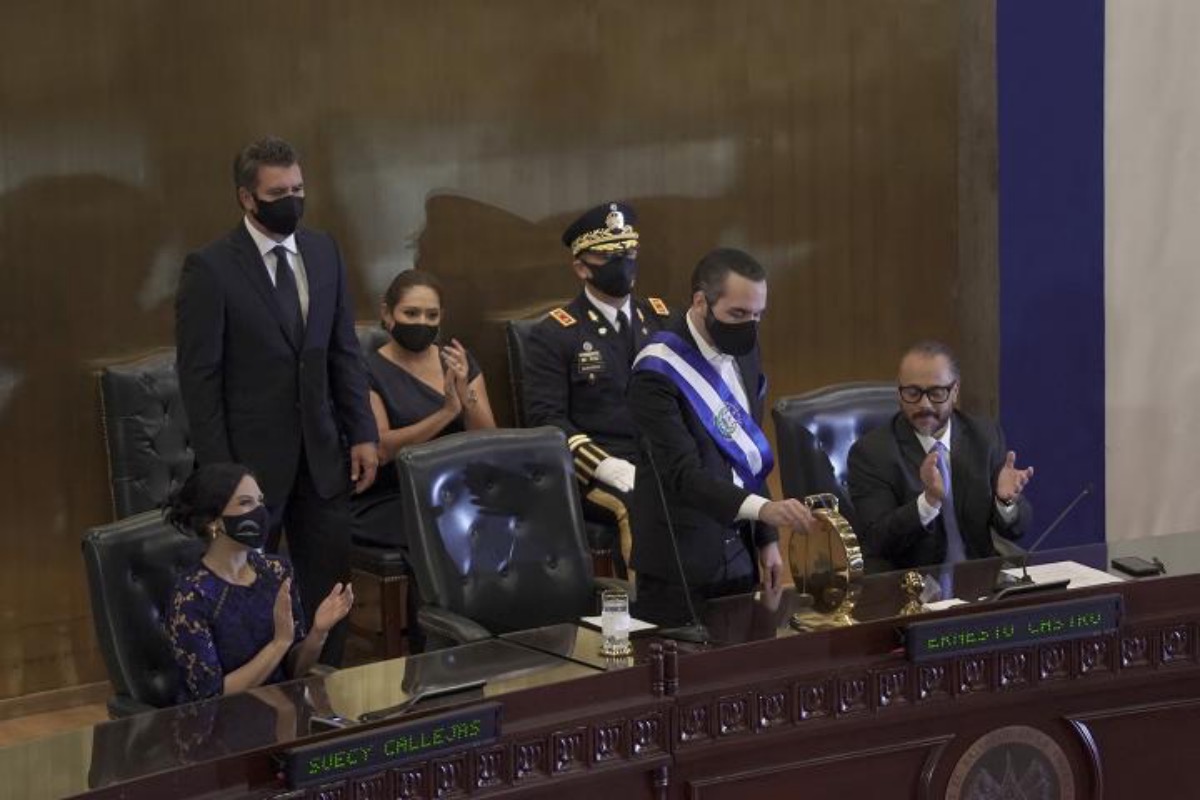

El Salvador President Nayib Bukele (Víctor Peña/El Faro)
El Salvador, in Brief: Bukele’s government told Wall Street investors in March that it hasn’t totally ruled out a deal with the IMF to avoid default, offering backup Plans B and C. All scenarios involve massive credits from regional development banks and, somehow, squeezing more tax revenue despite an aching global economy nearing recession. Only one of them included the expected but controversial pension nationalization.
Place Your Bets
On Wednesday, Bloomberg News placed El Salvador at the top of a list of nations to follow Sri Lanka and Russia in a “historic cascade of defaults.” Recent tweets from President Nayib Bukele, it appears, fell on deaf ears.
“They say we’re heading to default,” he tweeted on July 7 in response to an article from the New York Times critical of his bitcoin project. “Will they publish an apology once we pay everything on time?”
A source on Wall Street told El Faro English last Monday that the bonds continued to fall even after the tweet: “They [traders] don’t even believe the president anymore.”
Bukele faces a dual challenge: recovering international credibility and finding cash now. In recent weeks he received a life raft in the form of $220 million from the Central American Bank for Economic Integration to offset a popular fuel subsidy, and $100 more from the World Bank to reimburse pandemic purchases. The money will carry the government to the new year, but it’s not enough to avoid default through Christmas 2023.
It may come as a surprise —judging by Bukele’s sparring with the IMF— that his government said in a March presentation to members of the U.S. financial industry that it hasn’t given up on an IMF lifeline worth $1.3 billion.
If signed, the Salvadoran Treasury Ministry says the Inter-American Development Bank and World Bank each committed to chipping in another $200 million. The IMF could offer an additional $400 million. That‘s almost half of the $4.9 billion it will need through next year. Quite the boost.
Perhaps it was just a wink, given the slim odds of a deal since talks fell apart last year and the IMF criticism of Bukele’s authoritarianism, opacity, and devotion to bitcoin. “The government isn’t ready to practice transparency and anti-corruption,” an analyst from Bukele’s own Economic Cabinet anonymously admitted to Alvarado.
The Fund, he added, would “wait until they’re drowning and calling for help, and then impose its conditions.”
Where’s Satoshi?
The real trouble starts in January, when $800 million in Eurobonds come due. It will also need to balance a steeper budget, including paying $500 million eight months later.
In the presentation document revealed by El Faro’s Jimmy Alvarado, the Treasury Ministry told investors that its top priority will be to offload its shortest-term debt, the kind that comes due every year, to make room to immediately acquire more.
“It’s like paying off a credit card to then max it out again,” analogizes Alvarado.
Plan B includes almost $900 million in new bonds and a nationalization of pensions that the markets have been expecting for months. Financial analyst Ricardo Castaneda says that by removing pensions from its debt ledger the government would artificially improve its credit ratings. It’s unclear, though, if a move touching people’s private retirement funds would dent the president’s popularity.
As Plan C, according to the document, the government is weighing easing financial regulations to force private banks to use a larger percentage of their financial reserves to buy more state bonds, injecting both cash and risk in the financial system. This plan would also require a hodge-podge of loans from creditors.
In all three scenarios, the administration told investors it would ask the Caracas-based Development Bank of Latin America (CAF) for $500 million. A source close to CAF told El Faro English that its new representative in El Salvador will be tasked with overseeing all of Central America, enabling the bank’s expansion in the region.
Also in March, the Bukele administration promised investors that it would cut back public spending, mainly by dramatically reducing funding to municipalities. Note: 2023 is a pre-election year, making it difficult to believe that the government would make cuts to public works, subsidies, or the publicity budget.
They also promised to simultaneously generate $380 million in extra tax revenue including by closing exemptions and creating or increasing tolls on the wealthy, gun permits, and tobacco. But that goal could prove challenging: As Castaneda pointed out on Tuesday, tax collection in El Salvador is falling right now amid high inflation. In June it hit its lowest point this year.
It’s revealing that none of the government’s safety valves involve bitcoin bonds, despite the fact that for months Bukele argued they were a revolutionary solution above and beyond the international financial system.
According to the March presentation, the world’s first government to adopt the cryptocurrency is even considering saving its skin by borrowing directly from El Salvador’s central bank, a libertarian curse word.
Any tips or documents that you want to share with us? Perhaps an opinion? Updates on Crook’s whereabouts? Shoot us a note at english@elfaro.net.



[…] Any tips or documents that you want to share with us? Perhaps an opinion? Updates on Crook’s whereabouts? Shoot us a note at english@elfaro.net. […]